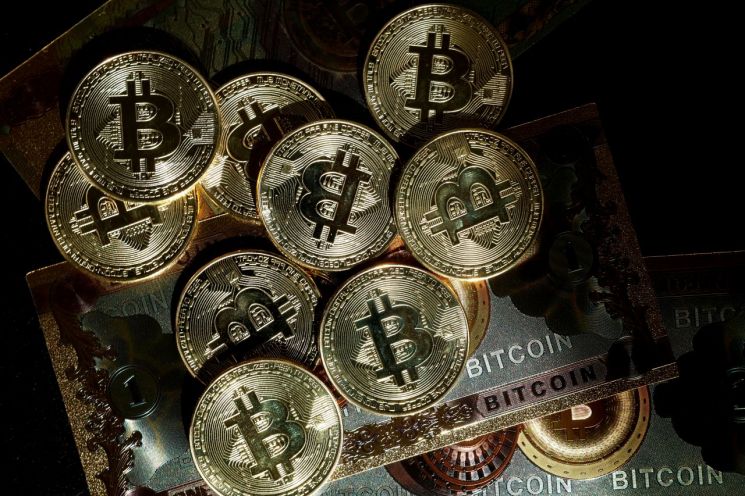El Salvador and Bhutan succeed in coin ‘Jonber’
Expect an influx of Russian coins after the end of the Ukraine War
Policy benefits expected to increase from Trump’s second term in office
Bitcoin hit an all-time high, surpassing the $90,000 mark thanks to former U.S. President Trump’s re-election success. El Salvador and Bhutan are receiving attention as the countries that have benefited the most from this surge in Bitcoin. There are also expectations that if the war in Ukraine ends in the future, various virtual currencies such as Bitcoin, which have been tied up in Russia, will be used again and the virtual currency market will become more active.
El Salvador, a country that succeeded in retaining coins for 3 years
Citizens who participated in a protest against the policies of El Salvador President Nayib Bukele march in San Salvador, El Salvador last July, holding a picket with President Bukele’s face drawn on it. Reuters Yonhap News
El Salvador also spent its budget to purchase Bitcoin after President Nayib Bukele adopted Bitcoin as legal tender in September 2021. The international community voiced concerns over El Salvador’s decision, which was suffering from enormous national debt at the time. In particular, the International Monetary Fund (IMF) officially warned that adopting virtual currency as fiat currency was too big a risk.
President Bukele’s decision also drew backlash from his own people. This is because it was a policy announced suddenly without forming a national consensus or conducting public opinion polls. Opposition protests were extreme, and incidents of setting fire to or destroying some Bitcoin automated teller machines (ATMs) occurred. However, despite this backlash, President Bukele strongly promoted Bitcoin-friendly policies.
The background to El Salvador’s adoption of Bitcoin as legal tender was diplomatic friction with the United States. Originally, El Salvador used the U.S. dollar as its legal currency, but this made it difficult to implement its own economic policies. It was a structure that had no choice but to be subordinate to the U.S. interest rate policy and economic policy. In particular, during the first Trump administration in 2017-18, the economy was greatly shaken by a drastic cut in U.S. support, and the need for economic independence emerged.
El Salvador is a representative pro-American country that has been under the administration of the United States since the 19th century, and still receives annual support from the United States. However, after the Trump administration cut support, voices calling for a break from economic dependence on the United States grew louder. The need for a new legal currency was raised, but issuing its own currency was realistically difficult. This is because it is difficult to secure credit and the cost of issuance is enormous. In this situation, Bitcoin has emerged as an extreme but feasible alternative.
It is currently known that El Salvador holds approximately 5,930 bitcoins. The average purchase price is around $40,000, which is more than double the profit considering the Bitcoin price, which is currently over $90,000. Just looking at the amount of Bitcoin purchased, it was purchased for $240 million (approximately 334.1 billion won), and its value has jumped to the current level of $500 million (approximately 696.1 billion won).
Bhutan, hit hard by COVID-19 tourism industry, revitalizes with coins
Taktsang Gompa, a major temple tourist attraction in Bhutan. Bhutan Tourism Board
View original icon
Meanwhile, Bhutan, one of the world’s poorest countries, also began collecting bitcoins in 2017 and is known to currently hold 12,500 bitcoins, more than twice that of El Salvador. Bhutan’s Bitcoin holdings were first revealed early this year, and it was revealed that most of them were obtained through mining.
Bhutan was able to secure a large amount of Bitcoin when mining farms in China relocated after COVID-19. China began cracking down on mining sites around 2020 due to the COVID-19 crisis and power shortages. At the time, China accounted for more than 75% of the world’s Bitcoin mining, and these mining farms were scattered across Russia, Central Asia, and Bhutan.
Bhutan, located in the Himalayan highlands, had optimal conditions for mining operations. It has advantageous location conditions for hydroelectric and solar power generation, and its small population of less than 800,000 results in low electricity consumption. Additionally, the cold climate of the alpine region helped prevent servers from overheating. In addition, the impact of COVID-19 was relatively small, making it possible to operate the mine without lockdown.
Atmosphere of truce in Ukraine war… Will the coin come back?
Russia has also recently been active in the Bitcoin market, proposing the establishment of an electronic currency payment platform mainly in BRICS countries and legalizing virtual currency mining. Before the Ukraine War, Russia was the world’s third-largest Bitcoin holder, following the United States and China, but international transactions for Bitcoin became difficult due to sanctions against Russia after the war.
Russia is experiencing great difficulties in international transactions due to sanctions against SWIFT, an international payment system. In particular, sanctions were fatal in a situation where oil and gas, major export products, were traded in dollars. Accordingly, Russia enacted a law in late July to allow free coin mining by individuals and corporations and to enable virtual currency payments in international transactions.
Experts point out that the Trump administration’s policy direction is important for the future outlook for Bitcoin. Expectations that the second Trump administration will incorporate Bitcoin as an institutional asset are driving the current upward trend. Until now, Bitcoin has been recognized as an alternative asset rather than institutional assets such as stocks or bonds, and has sometimes been seen as a means of transaction for terrorist groups, sanctioned countries, and criminal groups.
Bitcoin has both currency and raw materials

Reuters Yonhap News
View original icon
However, in order for Bitcoin to function as a currency, the current large price volatility must be resolved. Bitcoin not only has the characteristics of a currency but also a raw material, so its price varies depending on the country, and its volatility is very high due to the nature of trading 24 hours a day. This runs counter to the characteristics of money that require stable value.
In addition, as the Ukraine war enters a ceasefire phase, Bitcoins that have been locked up in Russia are released into the market, and the global Bitcoin market is expected to expand further when the trade dispute with China is resolved. In particular, China still has many exchanges and mining farms, so improving US-China relations is expected to be a key variable in the expansion of the Bitcoin market.
If Bitcoin becomes established as an international transaction method, it is expected that transaction costs will be reduced and rapid international remittances will be possible. It can also be an opportunity for new economic development for developing countries that are excluded from the dollar payment system. However, Bitcoin’s large price volatility can act as a risk factor in international transactions. Ultimately, it appears that the key to future development will be whether Bitcoin can find a balance between its value as an investment asset and its function as a currency.
Editor’s note: This content can also be listened to on Asia Economy’s economic podcast ‘AK Radio’. AK Radio is a platform that provides essential information to investors, including politics, economy, international current affairs, tech, bio, and digital trends. If you click the video play button within the article, you will hear the reporter’s actual voice. This article is a re-arrangement of the content broadcast on AK Radio through ChatGPT.
-

take
Reporter Lee Hyun-woo [email protected]
This is reporter Lee Hyeon-woo of the Asian Economy Planning and Reporting Department. We will quickly deliver news from various fields at home and abroad.
Subscription icon subscribe
-
take
Reporter Song Yun-jeong [email protected]
hello. This is reporter Song Yun-jeong.
Subscription icon subscribe
-
take
Reporter Kyung-do Lee [email protected]
-
edit
Reporter Choo Myung-hoon [email protected]
ⓒEconomic content platform for investors, Asia Economy (www.asiae.co.kr) Reproduction prohibited.

How might geopolitical tensions, such as the war in Ukraine, influence investor confidence in Bitcoin and its market dynamics?
1. What conditions make Switzerland an optimal location for Bitcoin mining operations?
2. How has the war in Ukraine affected the Bitcoin market and its potential for growth?
3. What recent developments have occurred in Russia’s stance on Bitcoin and virtual currency mining?
4. In what ways does Bitcoin’s volatility hinder its use as a currency, and how might this issue be addressed in the future?
5. Can you provide insights into the benefits and risks of using Bitcoin as an international transaction method for both individuals and nations?
6. What challenges do developing countries face when considering incorporating Bitcoin into their economic systems?
7. How do you see the role of the US government shaping the future of Bitcoin as an institutional asset and international currency?

